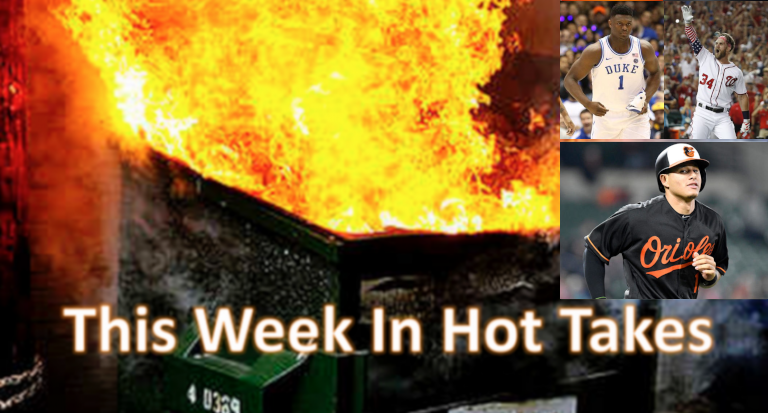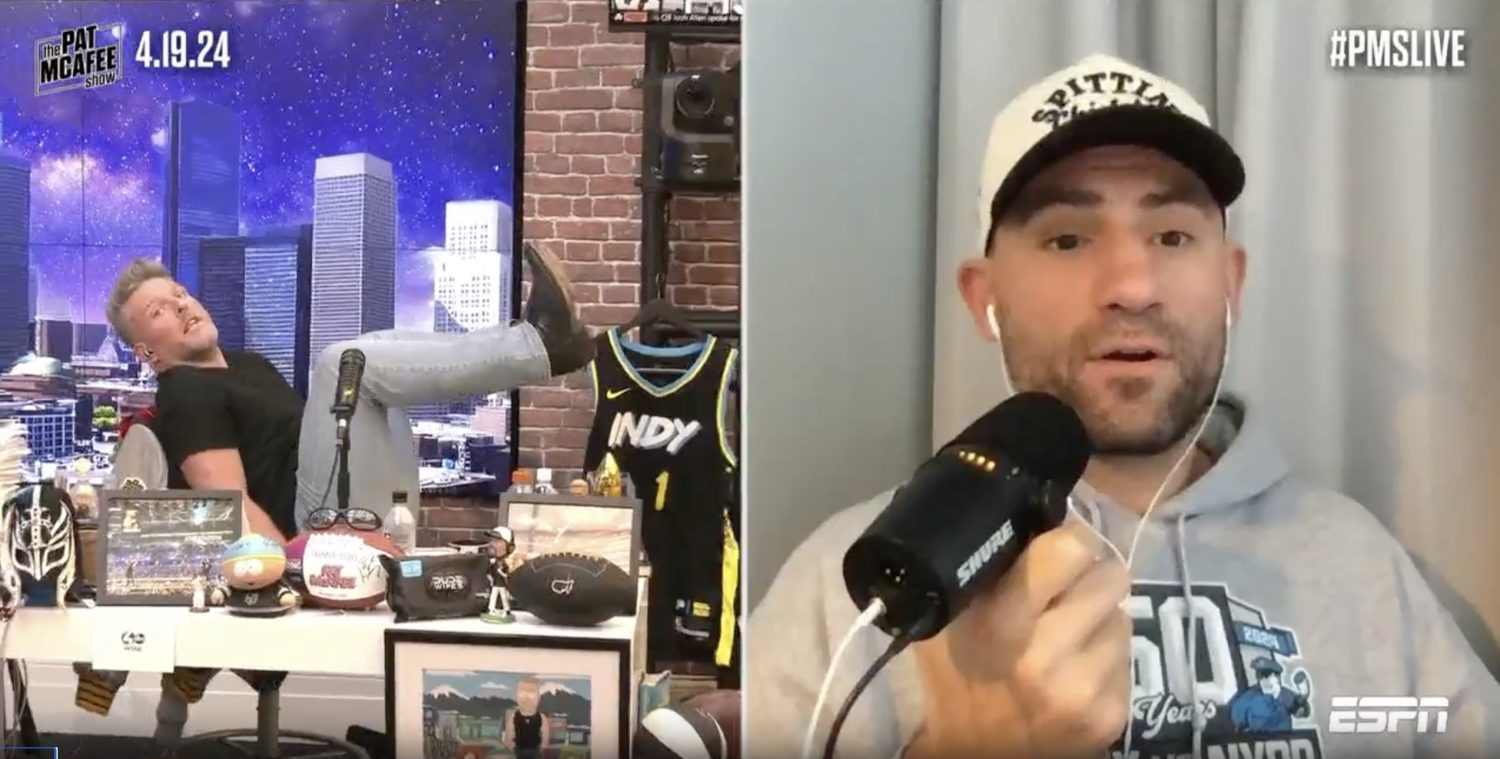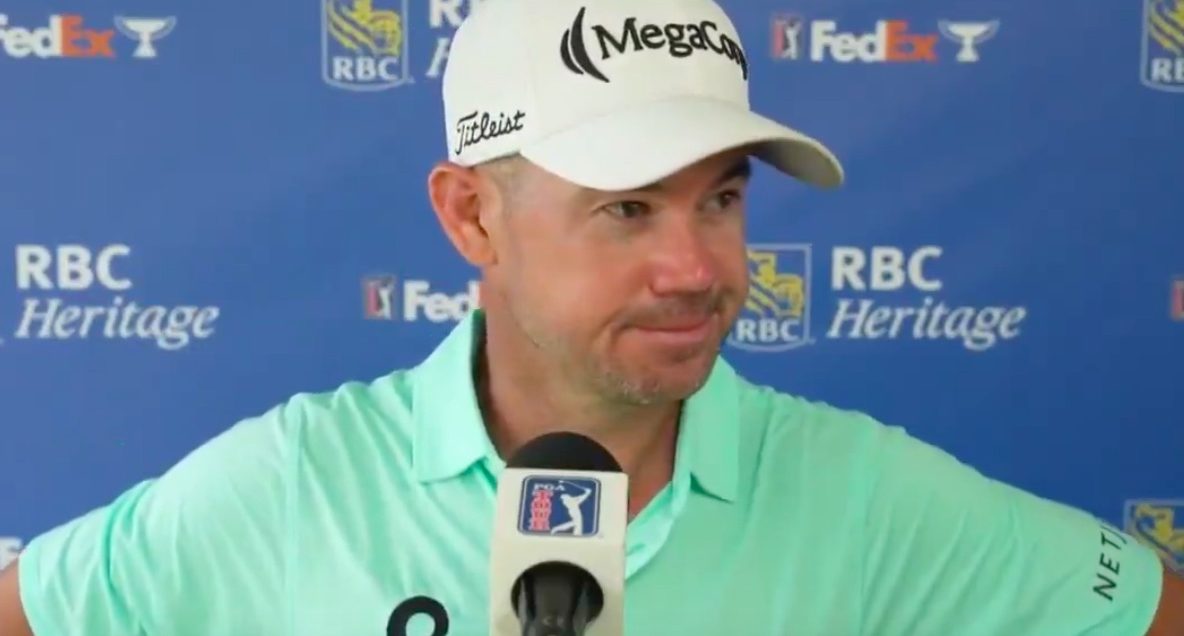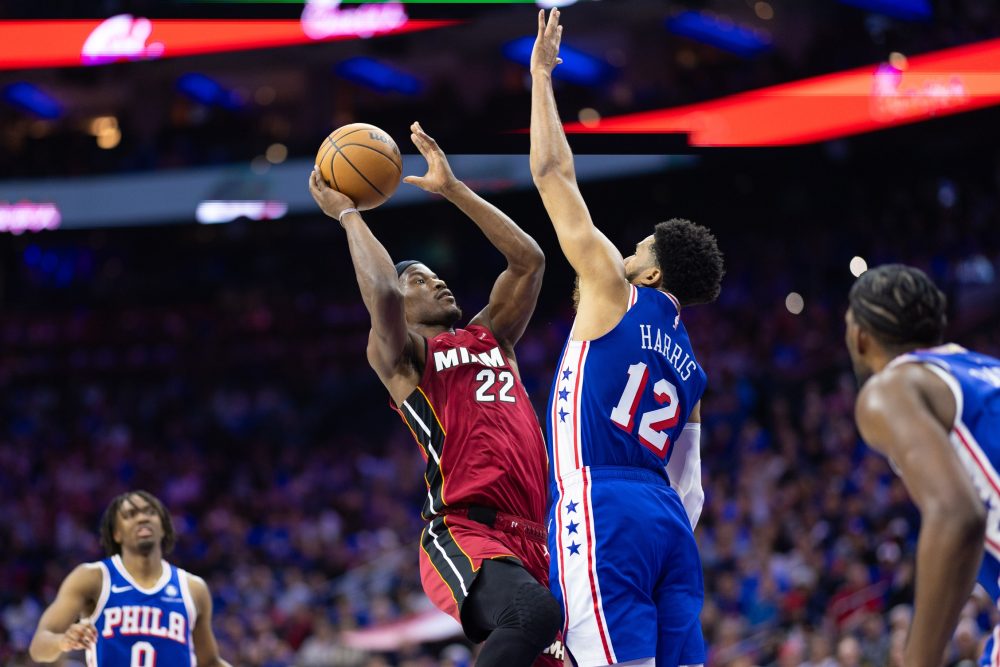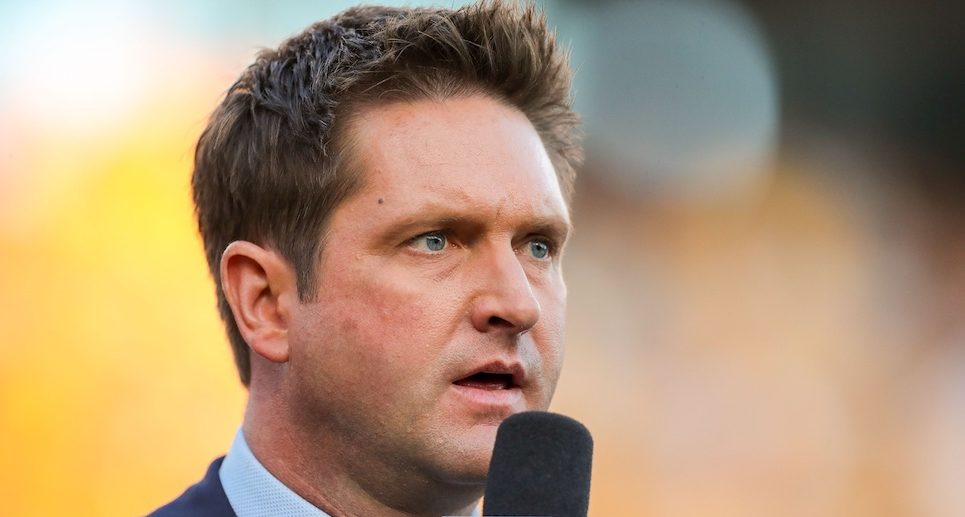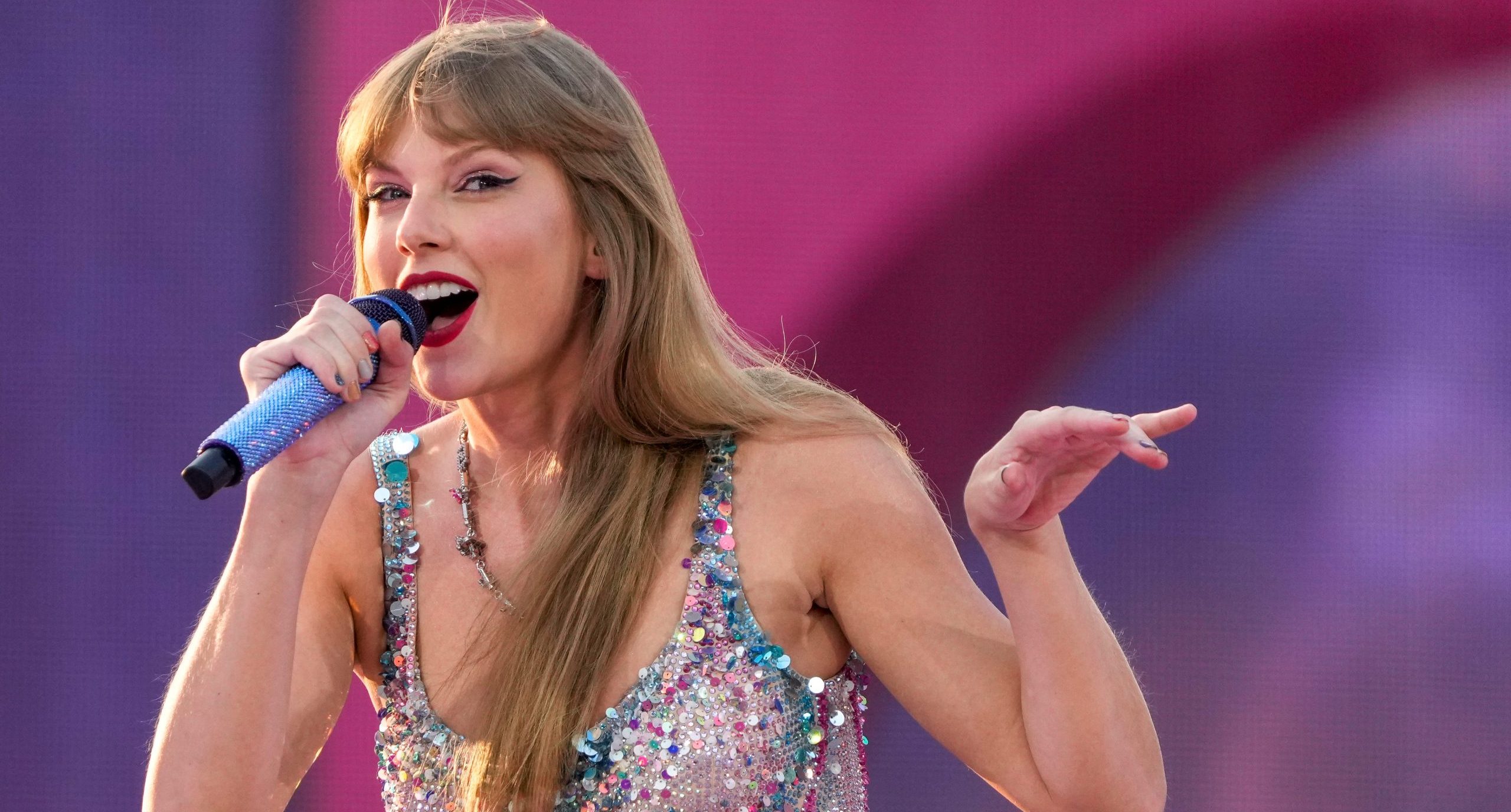Welcome to another edition of This Week In Hot Takes. This time around, we’re breaking down the hottest takes from Feb. 22-28.
5. Karl Ravech wonders “Have we moved on from collusion, or is that still a thing?”, citing Charlie Morton’s two-year deal: This week saw Bryce Harper finally signed by a MLB team, following Manny Machado’s deal last week. And the scale of those contracts ($330 million over 13 years and $300 million over 10 years respectively) caused some, like ESPN’s Karl Ravech, to claim those and other players’ deals proved the discussions of potential collusion keeping free agency contracts down weren’t valid:
330 million-Harper 300 million-Machado Corbin-Pollock-Morton etc etc etc etc. Have we moved on from collusion or is still a thing?Keuchel and Kimbrel on the clock
— Karl Ravech (@karlravechespn) February 28, 2019
This isn’t the first time this offseason an ESPN figure has downplayed collusion talk, as Mark Teixeira didn’t even mention it in a Jan. 29 commentary on why Harper and Machado were still unsigned, instead blaming unspecified “analytics.” But Ravech’s argument here wildly misunderstands what those discussing potential collusion were saying, and the Harper and Machado deals don’t disprove the actual cases in question.
First, only a fraction of MLB teams even showed any interest in Harper or Machado, which is silly considering how young and good they are and how they could elevate any team. Some that didn’t make serious offers came up with ludicrous rationales for why not, such as Cubs’ chairman Tom Ricketts (from a billionaire family, and running the most profitable team in baseball) claiming “We don’t have any more (money).” Meanwhile, MLB commissioner Rob Manfred ludicrously insisted that every team is trying to win even when a whole lot of them chose to not really participate in free agency. And the limited market led to these players not signing until into spring training, and it also led to their deals being much less than many initially expected, especially in terms of annual average value; Harper’s deal also has no opt-out provisions.
Oh, and that’s before covering the strong collusion argument of how numerous players have reported receiving no offers for a while, then large batches of almost identical offers. Or the very convenient slot-like deals teams appear to be signing players to, almost all short-term. Oh, and of the guys Ravech mentions, yes, Patrick Corbin and A.J. Pollock signed reasonably big deals (especially by this market’s standards; they signed for six years and $140 million and five years and $60 million respectively), but Charlie Morton’s two-year, $30 million deal with the Rays doesn’t exactly prove Ravech’s case. “NO COLLUSION!” is a stronger argument if, you know, there isn’t actually much supporting the idea of collusion, but the Harper and Machado contracts do not disprove the earlier arguments many made or the wider discussion. (And stars like Dallas Keuchel and Craig Kimbrel still being unsigned is evidence of further problems with the market.) But Ravech wants us to watch some dingers instead of discussing the terrifying truth.
Rating: 🔥🔥
4. Paul Sullivan claims spending from the Cubs and White Sox is “never enough for their fans”: One of the worst recurring takes is from sportswriters who just blindly prop up team ownership’s interests and repeat their claims without question, and Paul Sullivan of The Chicago Tribune sure did that this week:
No matter how much money the Cubs and White Sox spend, it's never enough for their fans https://t.co/q8Ps7HbIn4
— Paul Sullivan (@PWSullivan) February 24, 2019
Some highlights from that column:
The one constant in baseball is no matter how much the owner is willing to spend, it’s never enough to appease everyone.
That was apparent this week on both sides of town.
White Sox Chairman Jerry Reinsdorf was criticized for offering free agent Manny Machado only $250 million in guaranteed money instead of the $300 million it took for the Padres to sign him, while Cubs Chairman Tom Ricketts was forced to defend his spending habits despite a $212 million payroll, the biggest in franchise history.
Whether the hustle-is-optional approach by Machado would’ve been a good fit on a young, rebuilding team, or the Cubs’ chemistry would’ve suffered with the addition of a high-maintenance player such as Bryce Harper, seems to be irrelevant. To paraphrase late Raiders owner Al Davis, “Just spend, baby” is the motto most fans live by.
As mentioned, the Cubs made a MLB-high $102 million in operating income last season, with a total payroll of $194 million (as per Spotrac), under the luxury tax. Yes, they’re in that tax this year with an estimated payroll of $226 million, but that only leads to a $4.3 million tax bill. With similar profit numbers to last year, they would still be making around $66 million in operating income even after the luxury tax, so they really can’t cry poor. Meanwhile, the White Sox’s estimated $80 million payroll is 26th out of 30 MLB teams, and they made $30 million in operating income last year. But sure, they have no money to spend. Oh, and Machado put up 6.2 wins above replacement by Fangraphs last year, while Harper put up 3.5. But yeah, they’re not valuable at all to a team.
Rating: 🔥🔥🔥
The latest
Paying student-athletes might sound like a fairer way to treat students who generate so much money and attention for their colleges (not to mention the television networks that broadcast their games). But paying athletes would distort the economics of college sports in a way that would hurt the broader community of student-athletes, universities, fans and alumni. A handful of big sports programs would pay top dollar for a select few athletes, while almost every other college would get caught up in a bidding war it couldn’t afford.
The 30 largest universities in the country each routinely generate annual revenues exceeding $100 million from sports, but according to the National Collegiate Athletic Association, most of those revenues are spent covering operating expenses for the school’s athletic programs and paying tuition for their student-athletes. The majority of Division I colleges in the N.C.A.A. operate at a loss. In fact, among the roughly 350 athletic departments in the N.C.A.A.’s Division I, only about 24 schools have generated more revenue than expenses in recent years. The nation’s top five conferences made over $6 billion in 2015, billions more than all other schools combined, according to an ESPN analysis of N.C.A.A. data.
Those arguments from McDavis, and most of the rest of the points he makes, have been previously trotted out by the NCAA and its supporters over and over again, and they’ve been thoroughly debunked long before this piece. For one thing, “A handful of big sports programs would pay top dollar for a select few athletes, while almost every other college would get caught up in a bidding war it couldn’t afford” is exactly the way college recruiting works now, just without legal payments to players. College athletics is already dominated by the big programs. And the “NCAA athletic departments operate at a loss!” is much more convincing before you look into the incredible amounts they pay to coaches and spend on facility upgrades in efforts to try and attract further top recruits. This is a piece full of dumb arguments from McDavis, and ones that have previously been trotted out and refuted countless times. And the Times should have known better than to run it.
Moreover, receiving a scholarship may have seemed like a nice deal for McDavis, who averaged 4.6 points at Northern Colorado and was always going to be someone who followed the NCAA line of “going pro in something other than sports,” and who wasn’t exactly bringing incredible amounts of TV or ticket revenue from his athletic performance, but it looks a lot different for someone like Zion Williamson. Williamson has brought amazing ticket money and TV numbers to Duke without receiving much in return; if not for the NBA’s current minimum age rules, he probably would have gone straight there and been well-paid for his efforts (and as we discussed last week, no, he did not need to play at Duke for people to know who he was). Oh, and he went to Duke, not Northern Colorado? Man, won’t someone think of Northern Colorado’s inability to compete in this environment of not compensating players?!
Rating: 🔥🔥🔥🔥
2. Paul Daugherty says “Zion Williamson and other student-athletes are already getting paid”: Amazingly, McDavis’ piece wasn’t even the worst take on NCAA amateurism this week. That came from Paul Daugherty of The Cincinnati Enquirer, who argued that the limited classes student athletes can take for one year while waiting to become eligible for the NBA draft somehow compensate for all the revenue they bring in, in a piece titled “Zion Williamson and other student-athletes are already getting paid“:
Most have suggested Williamson should not risk his future pro millions for the nickels he’s getting now. Some have suggested Zion’s getting “nothing’’ for his good work on the hardwood.
Here are Williamson’s statistics:
21.6 points a game, 8.8 rebounds a game, 2.2 assists, a 68.3 shooting percentage.
Here are Duke’s statistics:
$55,960 tuition and fees, $8,706 room, $7,238 board. Total: $75,370.
Median U.S. Household Income as of last June: $62,175.
I guess some people’s definitions of nothing are different from other people’s definitions.
For every basketball player on scholarship, there are hundreds of other students who will graduate in debt. For every basketball player on scholarship, there are hundreds of other students waiting tables on weekends.
Rating: 🔥🔥🔥🔥🔥
1. Dan Clark writes “F**k you, Manny Machado:” When players leave via trade or free agency, some people often get salty. Boy, did Dan Clark of The Big Leagues Daily meet that qualification this week, swearing at Machado for daring to criticize the Orioles:
F**k You, Manny Machado
READ: https://t.co/vxnD9uBZ6H
"The best thing Machado can do right now, other than shutting his mouth, is investing some of that $300 million he’ll earn into a public relations specialist who can attempt to turn his reputation around. Because it stinks." pic.twitter.com/w856E912x6
— Dan Clark (@DanClarkSports) February 27, 2019
Some highlights of Clark’s rant about Machado daring to say the Orioles “didn’t show me a little bit of love” (and saying he felt more appreciation for the Dodgers for trading for him, and for the Padres for signing him this offseason):
“Fool me once, shame on you. Fool me twice, shame on me.” – but what happens when you’re fooled more times than that though, say three, four, or five times for example?
This is the scenario facing many Orioles fans this morning as they wake up on Wednesday to the news of Manny Machado’s repulsive comments late last night.
…Firstly, let’s be clear – these comments were (reportedly) not directed at the millions of Orioles fans who absolutely adored him, cheered for him, and supported him through good times and bad since being drafted as a prodigious teenager, third overall in the 2010 MLB Draft. No, they were directed at the organization as a whole.
Regardless, incredibly loyal Orioles fans won’t care. They just won’t – not one bit. Whether the comments were directed at the passionate fans or the organization as a whole, it’s absolutely irrelevant. The motive is clear and the venom cuts deep. A loyal, united fanbase, starved of success, it unites in times like these and collectively focuses its just as potent venom back at the attacker. In this case, Machado is the target – and quite frankly, he deserves all he gets.
Machado’s harsh, bridge burning, downright stupid comments came on the back of inking a 10-year, $300 million deal with the San Diego Padres. For months we’ve wondered who would be ‘lucky’ enough to sign the mercurial infielder, however now we must wonder if the Padres are equipped to control such an explosive, perhaps ungrateful individual.
How many chances must this man get? How many bridges must he burn, and enemies he create, before people – in all circles of baseball – finally understand just how bad his attitude can be sometimes?
…Not only is Machado factually wrong, he actually couldn’t be further from the truth when he says the Orioles didn’t show him any love. It’s quite the opposite in fact. All the organization ever did was protect him, have his back, and provide him with an environment which could help him thrive. The media was patient and avoided his often fiery temper, his manager allowed him to call his own shots and play wherever he choose, and the fans watched in awe, cheering for him for every night, ignoring the opinions of rival fans who disliked him.
The best thing Machado can do right now, other than shutting his mouth, is investing some of that $300 million he’ll earn into a public relations specialist who can attempt to turn his reputation around. Because right now, it absolutely stinks.
We have exclusive footage of Clark here:
Actually, what stinks is a writer choosing to write a long “F**k you, Manny Machado” post in response to Machado’s innocuous comments that the Orioles “didn’t show me a little bit of love.” That’s doesn’t seem like something to get this bent out of shape over.
Rating: 🔥🔥🔥🔥🔥
Hot Take Standings:
Jason Whitlock – Hall of Fame
Stephen A. Smith – 231
Skip Bayless – 200
Phil Mushnick – 169
Colin Cowherd – 76
Rob Parker – 59
Doug Gottlieb – 53
Shannon Sharpe – 35
Albert Breer – 29
Dan Shaughnessy – 26
Ray Lewis – 25
Don Cherry – 22
Darren Rovell – 20
Danny Kanell – 20
Britt McHenry – 20
JT The Brick – 20
Charles Barkley – 19
Dan Dakich – 18
Michael DeCourcy – 16
Jason McIntyre – 16
Andy Benoit – 15
Tony Massarotti – 15
Ben Maller – 15
Bill Plaschke – 14
Jason Smith – 13
Kirk Herbstreit – 13
Mike Felger – 13
The Sporting News – 13
Chris Broussard – 13
Rick Morrissey – 13
Mike Francesa – 12
Michael Wilbon – 12
John Middlekauff – 11
Keith Olbermann – 11
Greg Gabriel – 10
Rob Rossi – 10
Bill James – 10
Joe Simpson – 10
Bob Brookover – 10
Jeremy Roenick – 10
Berry Tramel – 10
Kristine Leahy – 10
Graham Couch – 9
Chris “Mad Dog” Russo – 9
Ross Tucker – 9
Ryen Russillo – 9
Garth Crooks – 9
C.J. Nitkowski – 9
Bob Ford – 8
John Feinstein – 8
Steve Simmons – 8
Frank Isola – 8
Michael Rapaport – 8
Bart Hubbuch – 8
Howard Eskin – 7
Trent Dilfer – 7
Damien Cox – 7
Mike Bianchi – 7
Cris Carter – 7
Pat Forde – 7
The Wall Street Journal – 6
Pat Leonard – 6
Luke Kerr-Dineen – 6
Terry Bradshaw – 6
Greg A. Bedard – 6
Dan Clark – 5
Paul Daugherty – 5
Michael Kay – 5
Tom Jones – 5
Max Kellerman – 5
Mark Readings – 5
Neil Warnock – 5
Patrick Bet-David – 5
Jared Stillman – 5
Jen Rainwater – 5
Matt Walsh – 5
Jon Steinberg – 5
Bill Welt – 5
Jack Todd – 5
Aaron Murray – 5
Chris Childers – 5
Mark Knight – 5
The Herald Sun – 5
David Booth – 5
Tom Nichols – 5
Keith Hernandez – 5
Bill O’Reilly – 5
Brandel Chamblee – 5
Michael McCarthy – 5
Mike “The Reputation Doctor®” Paul – 5
Dennis Dodd – 5
Rich Lowry – 5
Chris Reed – 5
San Diego Union-Tribune – 5
David Hookstead – 5
Tomm Looney – 5
Alex Shaw – 5
Rick Reilly – 5
Randall Mell – 5
Ian O’Connor – 5
Michael Bamberger – 5
Bob Bubka – 5
Cathal Kelly – 5
Pete Prisco – 5
Bill Simons – 5
Christine Flowers – 5
Jason Lieser – 5
John Steigerwald – 5
Josh Peter – 5
Alexi Lalas – 5
John Moody – 5
Marni Soupcoff – 5
Ryan Rishaug – 5
Kurtis Larson – 5
Rod Watson – 5
Dan Wolken – 5
Chuck Modiano – 5
Joel Klatt – 5
Steve Buffery – 5
Joe Morgan – 5
Nancy Armour – 5
Richard Justice – 5
Ameer Hasan Loggins – 5
Jesse Watters – 5
John McGrath – 5
Mike Sielski – 5
Gordon Monson – 5
Scott Fowler – 5
Terry Frei – 5
David Jones – 5
Sabrina Parr – 5
Abbey Mastracco – 5
Terry Cushman – 5
Rick Bozich – 5
Michael O’Doherty – 5
Simon Briggs – 5
Dan Wetzel – 5
Mike Parry – 5
Bob Ryan – 5
Robert Reed – 5
Pete Dougherty – 5
Dan Le Batard – 5
Marcus Hayes – 5
Kyle Turley – 5
Mike Ditka – 5
Erril Laborde – 5
Lowell Cohn – 5
Rosie DiManno – 5
Cody McDavis – 4
The New York Times – 4
Dan Crenshaw – 4
Mike Vaccaro – 4
Mike Klis – 4
Richard Keys – 4
Peter King – 4
Bruce Levine – 4
Malcolm Gladwell – 4
That’s Kappy – 4
Mitchell Nathanson – 4
The New York Daily News – 4
“Big” Jim Murray – 4
Jeff Diamond – 4
Marc Berman – 4
Evan Roberts – 4
Corbin Smith – 4
DJ Siddiqi – 4
The Express – 4
Mark Kiszla – 4
Greg Witter – 4
Myron Medcalf – 4
Bill Polian – 4
MJ Franklin – 4
Alex Reimer – 4
Joan Vennochi – 4
Matt Yglesias – 4
Bill Livingston – 4
Michael Irvin – 4
Shawn Windsor – 4
Brock Huard – 4
Byron Tau – 4
Maggie Gray – 4
Michael Powell – 4
Mark Spector – 4
Chad Forbes – 4
Gary Myers – 4
Mark Schlereth – 4
Andy Gray – 4
David Fleming – 4
Jeff Pearlman – 4
Tony Grossi – 4
FanSided – 4
Tony Kornheiser – 4
USA Today op-eds – 4
Nathan Ruiz – 4
Paul Sullivan – 3
Jerry Coleman – 3
Jon Johnson – 3
Trey Wingo – 3
Lance Zierlein – 3
Michael Salfino – 3
Tom Van Riper – 3
Andy Katz – 3
Tony La Russa – 3
Jim Brady – 3
Bill Simmons – 3
Mark Teixeira – 3
Wally Hall – 3
Damien Woody – 3
Victor Cruz – 3
Andrew Walker – 3
Jim Kaat – 3
Jason Gay – 3
Steven J. Brams – 3
Aaron Isaksen – 3
Will Muschamp – 3
Buck Lanford – 3
Stan Fischler – 3
Sonnie Wooden – 3
Chris Jones – 3
Kelly Smith – 3
Reggie Miller – 3
Mark Madden – 3
Larry Brooks – 3
Dan Canova – 3
Steve Rosenbloom – 3
Stephen Jackson – 3
Mike Sando – 3
Walt Borla – 3
Nick Cafardo – 3
Ice Cube – 3
Justin Peters – 3
Elise Finch – 3
Kevin Skiver – 3
David Bahnsen – 3
Harold Reynolds – 3
Kevin Reynolds – 3
Mike Sheahan – 3
Steve Greenberg – 3
Matt Burke – 3
Malcolm Gladwell – 3
Mike Milbury – 3
Mac Engel – 3
Nick Kypreos – 3
Caron Butler – 3
Don Brennan – 3
Robert Tychkowski – 3
Mike Johnston – 3
Jeff Mans – 3
Joe Browne – 3
Mike Harrington – 3
Greg Mitchell – 3
Karl Ravech – 2
Mike Florio – 2
Dari Nowkah – 2
Ella Dorsey – 2
The Hill – 2
John Kindt – 2
Bill Madden – 2
Tony Gonzalez – 2
Mike Greenberg – 2
Grant Paulsen – 2
Jeff Ermann – 2
Ed Werder – 2
Ben Mulroney – 2
Ron Cook – 2
Brian Kenny – 2
Barrett Sallee – 2
Craig Calcaterra – 2
Gareth Wheeler – 2
John Cornyn – 2
Tony Dungy – 2
Bruce Jenkins – 2
Chris Wesseling – 2
Seth Greenberg – 2
Doug Smith – 2
Newsweek – 2
Teddy Cutler – 2
Will Cain – 2
Bill Cowher – 2
Paul Finebaum – 2
Charley Casserly – 2
Amin Elhassan – 2
Jim Henneman – 2
Mitch Lawrence – 2
Nick Wright – 2
Domonique Foxworth – 2
Gary Parrish – 2
Michael Farber – 2
Andy Furman – 2
Donovan McNabb – 2
Seth Davis – 2
Jon Heyman – 2
Jason La Canfora – 2
Booger McFarland – 2
Joe Schad – 2
Cork Gaines – 2
Thanks for reading! Tune in next week for more This Week In Hot Takes. As always, you can send submissions to me via e-mail or on Twitter.

